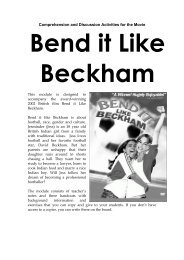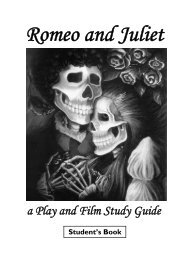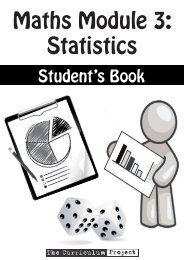Catch a Fire - The Curriculum Project
Catch a Fire - The Curriculum Project
Catch a Fire - The Curriculum Project
You also want an ePaper? Increase the reach of your titles
YUMPU automatically turns print PDFs into web optimized ePapers that Google loves.
Comprehension and Discussion Activities for the Movie<br />
CATCH A FIRE<br />
This module has been designed to accompany the film <strong>Catch</strong> a <strong>Fire</strong> (2006).<br />
<strong>Catch</strong> a <strong>Fire</strong> is based on real<br />
characters and events that took<br />
place in South Africa in the 1980s,<br />
under the apartheid regime.<br />
Patrick Chamusso is a black South<br />
African working at an oil refinery<br />
and as a football coach. Patrick is<br />
not at all involved in politics until<br />
he is wrongly arrested and<br />
tortured as a suspect in a<br />
bombing. <strong>The</strong> injustices that<br />
Patrick and his wife experience<br />
lead him to join the anti-apartheid<br />
struggle. <strong>Catch</strong> a <strong>Fire</strong> shows<br />
Patrick’s transformation into a<br />
freedom fighter and anti-terrorist<br />
agent Nic Vos’s attempts to catch<br />
him.<br />
<strong>The</strong> guide consists of teacher’s<br />
notes and three handouts that you<br />
can copy and give to your<br />
students. If you don’t have access<br />
to a copier, you can write these on<br />
the board.<br />
You might like to do many of<br />
these activities in students’ first<br />
language. It is important that they<br />
understand the ideas behind the<br />
story, and this is easier in their<br />
own language.
1. Before You Watch<br />
1.1: South Africa and Apartheid brainstorm<br />
Play the first 1: 20 minutes of the movie, showing apartheid-era footage. Ask<br />
students if they recognise what country it might be. What are the people talking about?<br />
What problems are they protesting?<br />
Ask students what they know about South Africa. Where is it? Who are the people<br />
living there? Have students brainstorm anything they know. Write their answers on<br />
the board.<br />
Give copies of Worksheet 1: Background Information to your students, or explain<br />
the information to them. Read through the information with students.<br />
Do another brainstorm about apartheid and segregation. Students can refer to the<br />
“Useful Vocabulary” section of Worksheet 1. Again, write the students’ ideas on the<br />
board.<br />
As a class, read through the vocabulary definitions in Worksheet 1. Discuss each<br />
word as it appears in the background information to make sure students fully<br />
understand the meanings.<br />
Exercise A:<br />
1. F – <strong>The</strong> apartheid system was created to separate white South Africans from<br />
black, Indian and Asian South Africans.<br />
2. T<br />
3. F – “Homelands” were special areas of the country where black people were<br />
forced to live..<br />
4. F – <strong>The</strong> anti-apartheid movement had violent and nonviolent protests.<br />
5. F – South Africa ended apartheid between 1991 and 1994.<br />
Exercise B:<br />
Students look at the character sheet, and predict what will happen in the movie. Write<br />
all suggestions on the board.<br />
Teacher’s Notes
2. While You Watch<br />
2.1: Two South African Lives 00.00 – 20.35<br />
Give copies of Worksheet 2: While You Watch to your students, or write the<br />
questions for 2.1 on the board. Play the film to 20.35.<br />
Exercise A:<br />
1. While driving home from the wedding, there is a roadblock because of an explosion the<br />
night before.<br />
2. <strong>The</strong> policeman is suspicious because he does not believe that the car really belongs to<br />
Patrick.<br />
3. Colonel Nic Vos is part of the anti-terrorist squad.<br />
4. Patrick works at the Secunda oil refinery.<br />
5. Johnny gets mad at Patrick and says that he “always sides with the Boer.”<br />
6. Patrick turns off the radio because the grandmother is listening to Radio Freedom and<br />
he does not want to get in trouble.<br />
7. Patrick goes shopping with Precious to find presents for their daughters.<br />
8. Colonel Nic Vos tries to teach his daughter how to shoot a gun.<br />
Exercise B:<br />
1. <strong>The</strong>y were setting a bomb.<br />
2. <strong>The</strong> police officer does not believe that a black man can earn enough money to buy a<br />
car.<br />
3. Because Johnny is using a “whites only” toilet, and Patrick does not want him to get<br />
in trouble.<br />
4. Because Radio Freedom supports the insurgency against apartheid.<br />
Exercise C: Possible answers<br />
similarities differences<br />
- Both families have two daughters<br />
- Both fathers want to protect their daughters<br />
Teacher’s Notes<br />
- <strong>The</strong> Vos family is white, the Chamusso family<br />
is black<br />
- <strong>The</strong> Vos family are richer than the Chamusso<br />
family<br />
- Precious’s mother lives with the Chamussos<br />
and helps look after her grandchildren
2.2: Arresting the Wrong Man 20.36 – 48.18<br />
Play the film to 48.18. If students don’t have Worksheet 2, write the exercises on the<br />
board before you play the film.<br />
Answers to 2.2<br />
Exercise A:<br />
1. F – Patrick does not go to work because his football team is playing in the<br />
championship game.<br />
2. T<br />
3. F – At Secunda, Patrick doesn’t join the other workers in singing a song about<br />
Freedom Fighters.<br />
4. T<br />
5. T<br />
6. F – Precious is arrested and beaten because the police want to push Patrick to confess.<br />
7. F – Patrick confesses because he wants the police to free Precious, even though he<br />
wasn’t involved in the explosion.<br />
8. T<br />
Exercise B:<br />
1. Because Patrick’s own father left the family when Patrick was young, and he thinks it<br />
is more painful to understand why a father would leave than to not know who your<br />
father is.<br />
2. Patrick does not want to be involved in anything political, and he also does not want<br />
to risk losing his job.<br />
3. <strong>The</strong>y torture Patrick in many different ways and interrogate him about the bombing<br />
at Secunda and anti-apartheid groups.<br />
4. Because Nic Vos arrested Precious and they beat her, and Patrick can’t understand<br />
why Nic would do this to an innocent woman.<br />
Exercise C: Possible answers:<br />
1. Perhaps Nic secretly believes he is doing the wrong thing by supporting the current<br />
government, or maybe he is just saying things he does not believe so that Patrick will<br />
trust him.<br />
2. After being arrested and tortured for a crime he did not commit, Patrick cannot<br />
handle any more when they arrest and beat his wife Precious. <strong>The</strong> horrible treatment<br />
leads Patrick to think that he would rather be jailed or executed for a crime he did not<br />
commit, rather than allow the current situation to continue.<br />
3. After experiencing the cruel and discriminating treatment of the police, Patrick has<br />
become more political and now has a desire to fight back. Students can discuss his<br />
transformation from someone who did not care about politics to someone who wants<br />
to listen to the freedom fighter radio program.<br />
4. As well as English, some people use Afrikaans (the language of the Boers) and<br />
African languages, mostly Zulu.<br />
Teacher’s Notes
2.3: Becoming a Freedom Fighter 48.19 – 1.12.23<br />
Play the film to 1.12.23. If students don’t have Worksheet 2, write the exercises on<br />
the board before you play the film.<br />
Exercise A:<br />
1. Patrick takes a bus from South Africa to Mozambique to join the anti-apartheid<br />
armed resistance.<br />
2. Patrick meets with Obadi and Joe Slovo, and tells them he wants to join the ANC.<br />
3. When the ANC training base is raided, Patrick and Pete My Baby are in the back<br />
room because they do not have legal working papers to show.<br />
4. After the raid, Colonel Nic Vos receives an award for “protecting the country from<br />
terrorists.”<br />
5. Patrick and Totsie, a female ANC member, go to Swaziland to prepare for a mission<br />
in South Africa.<br />
6. When Nic is looking at the Secunda report book, he notices that Patrick worked in the<br />
core reactor.<br />
7. Nic knows about Patrick’s plans because he gets information from an informer.<br />
Exercise B:<br />
1. c<br />
2. d<br />
3. a<br />
4. b<br />
Exercise C: Possible answers:<br />
1. Students discuss how Patrick was treated at the interrogation centre, as well as their<br />
thoughts about “justice” and “injustice.”<br />
2. Students discuss what freedom means for different groups in South Africa. For black<br />
people it might mean to have equal rights with white people. For pro-apartheid whites,<br />
it might mean security from crime and terrorism.<br />
3. Students discuss what oil represents in South Africa - who owns it and makes money<br />
from it.<br />
4. Perhaps they also wanted equality between different races, and thought that the<br />
country would be a better place without apartheid, even if it meant they had to give<br />
up some of their power and privileges.<br />
Teacher’s Notes
2.4: A Ticking Bomb 1.12.24 – end<br />
Play the film to the end. If students don’t have Worksheet 2, write the exercises on<br />
the board before you play the film.<br />
Exercise A:<br />
1. T<br />
2. F – Nic Vos leaves an envelope of photos for Precious, showing Patrick with a female<br />
ANC member.<br />
3. T<br />
4. T<br />
5. F – Precious tells the police where Patrick is hiding.<br />
6. F – Patrick is sentenced to 24 years in prison.<br />
7. T<br />
Exercise B:<br />
1. Because he wants Precious to believe that Patrick has a new girlfriend, so that<br />
Precious will be angry and not protect Patrick.<br />
2. Because when Nic looked at the Secunda report book, he saw where Patrick used to<br />
work and thought that Patrick would understand those areas of the refinery best.<br />
3. Because after seeing the photos, she thinks Patrick has betrayed her again, so she does<br />
not want to protect him.<br />
4. Patrick is probably apologising for being unfaithful and leaving Precious alone with<br />
their daughters; Precious is apologising for telling Nic Vos where to find Patrick.<br />
Exercise C: Possible answers:<br />
1. Perhaps because he didn’t want his daughter to be afraid of her father’s work.<br />
2. He might have felt angry, but a bit guilty too as he had lied to her about Miriam and<br />
his son, and because he had left his family to become a freedom fighter.<br />
3. Patrick betrayed Precious by not telling her about his son with Miriam. Precious<br />
betrayed Patrick by telling the police where he was hiding.<br />
Teacher’s Notes
3. After You Watch<br />
Give copies of Worksheet 3 to your students,or explain the information to them.<br />
3.1: What’s Happening?<br />
Exercise A:<br />
3, 4, 1, 2<br />
Exercise B: Possible answers:<br />
Picture 1 – Nic is offering Precious help and money if she agrees to help find Patrick<br />
Picture 2 – <strong>The</strong> ANC are burying the freedom fighters who were killed in the raid.<br />
Picture 3 – Nic is teaching his daughter to shoot a gun.<br />
Picture 4 – Patrick has been arrested because the police suspect he was involved in<br />
the Secunda bombing. Nic is interrogating him.<br />
3.2: If It Were You…<br />
Exercise A:<br />
Students write letters from Patrick to Precious, explaining why he is leaving to join<br />
the ANC. You might want to have students read each other’s letters, or mark them<br />
yourself.<br />
Exercise B: Possible answers:<br />
For Patrick, he could forgive Precious for telling Nic Vos where he was hiding, and he<br />
could forgive Nic for wrongfully arresting him, torturing him, beating his wife and<br />
generally making his life difficult. He might also want to forgive all the people who<br />
were part of the apartheid system; the political leaders, police, and everyone who<br />
benefitted from it.<br />
Exercise C:<br />
Students write paragraphs explaining the different uses of violence.<br />
If students want to find out more about Patrick Chamusso and the<br />
orphanage he runs in South Africa, they can visit his website:<br />
http://www.twosisters.org.za/<br />
Teacher’s Notes<br />
2.
Copy this and give it out to your students.<br />
Worksheet 1: Background Information<br />
Apartheid in South Africa<br />
<strong>The</strong> English and the Dutch colonised<br />
South Africa in the 1600s. When the Dutch,<br />
known as ‘Boers’ or ‘Afrikaners’ gained a<br />
political majority in 1948, they invented<br />
the system of apartheid to increase white<br />
people’s control over the economy and<br />
social system. <strong>The</strong> system of apartheid<br />
legally expanded existing racial separation.<br />
Laws restricted the movement, the<br />
residential areas, the jobs, and the voting<br />
rights of black and sometimes Indian<br />
people.<br />
All people living in South Africa were<br />
classified into racial groups: black, white,<br />
coloured (mixed race, or not black or<br />
white), and Indian. Apartheid laws:<br />
- prohibited people of different races getting married<br />
- created special areas of the country for certain racial groups<br />
- segregated public facilities such as toilets, parks and hospitals<br />
- restricted jobs and education for black people.<br />
<strong>The</strong> apartheid laws were strictly enforced, especially because the government passed a<br />
law allowing for harsh penalties and strict states of emergency for any protest of<br />
current laws. Nevertheless, there was resistance against the oppressive apartheid<br />
policy. Some groups organised peaceful protest, and some groups organised armed<br />
resistance. <strong>The</strong> African National Congress (ANC) launched strikes, civil disobedience<br />
campaigns, and boycotts in the 1950s. <strong>The</strong> violent police response to these protests<br />
increased support for armed resistance. Both the ANC and other resistance groups<br />
were banned by the government. Nelson Mandela, leader of the ANC, was jailed in<br />
1964.<br />
Protests continued throughout the following decades, including the widely known<br />
1976 Soweto uprising, when police killed up to 600 students and injured 4,000 who<br />
were peacefully protesting. International opinion was turning firmly against apartheid.<br />
Some of the apartheid laws were removed in the 1980s, but apartheid policy fully<br />
ended in the early 1990s. In the first post-apartheid elections the ANC won a majority<br />
of votes and Nelson Mandela became the first black president of South Africa.<br />
South Africa continues to struggle with its recovery after apartheid; crime rates and<br />
unemployment are high, and corruption is common in the government. South Africa is<br />
working to fight issues such as widespread poverty, violent crime and HIV infection.<br />
Student Worksheet
Useful Vocabulary:<br />
ANC: African National Congress, a group organised to resist discrimination<br />
and apartheid in South Africa. After apartheid ended they became a political<br />
party, and have won every post-apartheid election.<br />
apartheid: the government policy in South Africa from 1948 – 1991, which<br />
enforced a deep system of segregation and discrimination based on racial<br />
groups.<br />
civil disobedience: when people refuse to obey certain laws or pay certain taxes<br />
because they want to protest the laws peacefully.<br />
colonise: when one country sends a group of people to take political control of<br />
another place.<br />
discrimination: the unfair treatment of different types of people, for example<br />
different races, or different sexes.<br />
informer: someone who gives information about illegal activity to the<br />
authorities.<br />
interrogation: when someone aggressively asks questions of a person<br />
suspected of a crime.<br />
oil refinery: an industrial place where unwanted things are removed from oil<br />
to make it suitable for use.<br />
racism: when people believe that a racial group is inferior to other racial<br />
groups, and treat different racial groups in different ways.<br />
segregation: the enforced separation of different racial groups.<br />
Exercise A: True or false? If false, please write the correct sentence.<br />
1. <strong>The</strong> apartheid system was created to separate the Boers and the English.<br />
2. Under the apartheid system, marriage between people of different<br />
races was not allowed.<br />
3. “Homelands” were special areas of the country where black people<br />
decided to live.<br />
4. <strong>The</strong> anti-apartheid movement had only nonviolent protests.<br />
5. South Africa continues to operate under the apartheid system.<br />
Exercise B: Look at the character sheet. What do you think will happen in the film?<br />
Student Worksheet
Characters in the Film:<br />
Patrick Chamusso works at the<br />
Colonel Nic Vos<br />
Secunda Oil refinery, and coaches a<br />
football team for small boys in his<br />
neighbourhood.<br />
Colonel Nic Vos is the head<br />
of the anti-terrorist<br />
interrogation centre. He is<br />
married, with two daughters.<br />
Precious is Patrick’s wife. <strong>The</strong>y<br />
have two daughters.<br />
Obadi is a military<br />
trainer in the ANC’s<br />
armed resistance.<br />
Lindiwe and Albertina are Patrick and Precious’s daughters.<br />
Mama Dorothy is Precious’s mother.<br />
Johnny is a friend of Patrick’s.<br />
Zuko is a friend of Patrick’s.<br />
Sixpence is Zuko’s young nephew.<br />
Pete My Baby and Totsie are ANC fighters.<br />
<strong>The</strong> actor Derek Luke, who plays Patrick Chamusso in the film, talks to the real Patrick Chamusso.<br />
Joe Slovo and Nelson Copy Mandela this and are give also it real out people to your – most students other characters are fictional.<br />
Student Worksheet<br />
Joe Slovo is the<br />
commander of the<br />
ANC and South<br />
Africa Communist<br />
Party’s armed<br />
resistance.<br />
Miriam is an ex-lover of<br />
Patrick’s. He is the<br />
father of her son.<br />
Nelson Mandela was<br />
an ANC leader who<br />
later became South<br />
Africa’s first black<br />
Prime Minister.
Worksheet 2: While You Watch<br />
2.1: Two South African Lives 00.00 – 20.35<br />
Exercise A: Complete the following sentences with words from the box.<br />
Oil refinery Patrick Boer Freedom Colonel Nic Vos terrorist Precious explosion<br />
1. While driving home from the wedding, there is a roadblock because of<br />
an ____________ the night before.<br />
2. <strong>The</strong> policeman is suspicious because he does not believe that the car<br />
really belongs to ____________.<br />
3. Colonel Nic Vos is part of the anti-____________ squad.<br />
4. Patrick works at the Secunda ____________.<br />
5. Johnny gets mad at Patrick and says that he “always sides with the<br />
____________.”<br />
6. Patrick turns off the radio because the grandmother is listening to<br />
Radio ____________ and he does not want to get in trouble.<br />
7. Patrick goes shopping with ____________ to find presents for their<br />
daughters.<br />
8. ____________ tries to teach his daughters how to shoot guns.<br />
Exercise B: Answer the questions below.<br />
1. What were the people doing at the train tracks during the night?<br />
2. Why does the police officer not believe that Patrick owns the car?<br />
3. Why does Patrick yell, “Johnny, whites only!” to his friend at Secunda?<br />
4. Why does Patrick think that listening to Radio Freedom could get him<br />
sent to jail?<br />
Exercise C: Discuss the following in groups or as a class.<br />
<strong>The</strong> movie shows two families; Patrick Chamusso’s family, and Nic<br />
Vos’s family. What are the similarities and differences between these<br />
two families?<br />
Make two lists:<br />
similarities differences<br />
- Both families have two daughters - <strong>The</strong> Vos family is white, the Chamusso<br />
family is black<br />
Student Worksheet
2.2: Arresting the Wrong Man 20.36 – 48:18<br />
Exercise A: True or false? If false, write the correct sentence.<br />
1. Patrick does not go to work because he is sick.<br />
2. Patrick visits another woman, Miriam, who is the mother of his son.<br />
3. At Secunda, Patrick joins the other workers in singing a song about<br />
Freedom Fighters.<br />
4. Patrick is arrested as a suspect in the Secunda explosion.<br />
5. Patrick is a suspect because he called in sick before the explosion, and<br />
he had a fake doctor’s note.<br />
6. Precious is arrested and beaten because she is a suspect in the<br />
explosion.<br />
7. Patrick confesses because he committed the crime.<br />
8. Colonel Nic Vos lets Patrick go because his fake confession does not<br />
match the actual crime.<br />
Exercise B: Answer the questions below.<br />
1. Why does Patrick think it is better that his son does not know who he<br />
is?<br />
2. Why doesn’t Patrick sing the Freedom Fighter song with the other<br />
workers?<br />
3. What do they do to Patrick at the anti-terrorist interrogation centre?<br />
4. Why does Patrick say to Nic Vos, “What kind of man are you?”<br />
Exercise C: Discuss the following questions in groups or as a class.<br />
1. When Nic brings Patrick to his house for a meal, he says that the<br />
current situation won’t last because there are 25 million black people<br />
and 3 million white people. Do you think Nic believes this? Why?<br />
2. Patrick makes a fake confession about the bombing at Secunda. Why<br />
do you think he does this, even though it could bring extreme<br />
punishment to him?<br />
3. Why does Patrick turn up the volume on the Radio Freedom program?<br />
4. <strong>The</strong> film is mostly in English, but other languages are also used. What<br />
do you think these languages are?<br />
Student Worksheet
2.3: Becoming a Freedom Fighter 48.19 – 1.12.23<br />
Exercise A: Complete the following sentences with words from the box.<br />
Pete My Baby core reactor Colonel Nic Vos Mozambique<br />
informer South Africa ANC Joe Slovo Patrick<br />
1. Patrick takes a bus from South Africa to ____________ to join the antiapartheid<br />
armed resistance.<br />
2. Patrick meets with Obadi and ____________, and tells them he wants to<br />
join the ____________.<br />
3. When the ANC training base is raided, Patrick and ____________ are in<br />
the back room because they do not have legal working papers to show.<br />
4. After the raid, ____________ receives an award for “protecting the<br />
country from terrorists.”<br />
5. ____________ and Totsie, a female ANC member, go to Swaziland to<br />
prepare for a mission in ____________.<br />
6. When Nic is looking at the Secunda report book, he notices that Patrick<br />
worked in the ____________.<br />
7. Nic knows about Patrick’s plan’s because he gets information from an<br />
____________.<br />
Exercise B: Match the quotes below with the person who said them.<br />
1. “<strong>The</strong>y have killed my friend, tortured my wife for nothing.<br />
Yes, I want to go on.”<br />
2. “You've lost your house now. Living in a one-room shack. No<br />
money coming in. Maybe I can help you, Precious. Use my<br />
influence. Find you somewhere better to live.”<br />
3. “On all the anniversaries, my marriage, the birthdays, in my<br />
mind, I see my wife and my kids. And I put myself in that place,<br />
there with them. And I imagine what it will be like when South<br />
Africa is free and I am home again. And then my heart starts<br />
to beat faster.”<br />
4. “From now on your name is James Mabuso. James Mabuso.<br />
Remember, when you get to Secunda, keep away from your<br />
family. Keep away from your wife.”<br />
Student Worksheet<br />
a. Obadi<br />
b. Totsie<br />
c. Patrick<br />
d. Nic
Exercise C: Discuss the following questions in groups or as a class.<br />
1. Why does Patrick decide to join the ANC, even though he did not care<br />
about politics before?<br />
2. Patrick and Obadi discuss what life in South Africa will be like when it<br />
is free. What do you think they mean when they talk about a “free”<br />
South Africa?<br />
3. Why do the ANC members want to set off a bomb at Secunda Oil<br />
Refinery?<br />
4. Many white South Africans, such as Joe Slovo, were members of the<br />
ANC. Why do you think they supported equality for black people?<br />
2.4: A Ticking Bomb 1.12.24 – end<br />
Exercise A: True or false? If false, write the correct sentence.<br />
1. Nic Vos’s daughter shot Pete My Baby when he broke into their house.<br />
2. Nic Vos leaves an envelope of photos for Precious, showing Patrick<br />
with his new girlfriend.<br />
3. After the first bomb explodes, there is enough time for all the workers<br />
to evacuate before the second bomb is planned.<br />
4. Nic disables the second bomb before it explodes.<br />
5. Miriam tells the police where Patrick is hiding.<br />
6. Patrick is sentenced to two years in prison.<br />
7. Patrick is released from prison early because apartheid ends in 1991.<br />
Exercise B: Answer the questions below.<br />
1. Why did Nic give Precious photos of Patrick with Totsie?<br />
2. How does Nic know where to look for the bomb?<br />
3. Why does Precious tell Nic where to look for Patrick?<br />
4. When Patrick is freed from prison, he and Precious both say “I’m<br />
sorry.” What are they each apologising for?<br />
Exercise C: Discuss the following questions in groups or as a class.<br />
1. Why does Nic tell his daughter that the man she shot and killed was a<br />
thief, even though Nic tells the police it was “Pete My Baby, a terrorist”?<br />
What was Nic thinking about his “anti-terrorism” work after it mixed<br />
up with his personal life?<br />
2. How do you think Patrick felt when he saw that Precious told Nic<br />
where to find him?<br />
3. Patrick and Precious both betrayed each other, but for different reasons<br />
— what were those reasons?<br />
Student Worksheet
Copy this and give it out to your students<br />
Worksheet 3: After You Watch<br />
3.1: What’s Happening?<br />
Exercise A: Put<br />
these pictures in<br />
order.<br />
Exerc ise B:<br />
Describe what is<br />
happening in<br />
these pictures.<br />
3.2: If It Were You…<br />
1. 2.<br />
3.<br />
Exercise A: Pretend you are Patrick Chamusso, and write a secret letter to Precious<br />
explaining why you are leaving the family to join the ANC. Explain what led you to<br />
make the decision, and why you think this is the right decision to make.<br />
Exercise B: Patrick speaks about Nelson Mandela and says, “But our leader, our<br />
father, he told us, we could never be free until we learned to forgive.” At the end of<br />
the movie, the real Patrick Chamusso explains why he did not kill Nic Vos when he<br />
had the opportunity. What does “forgiveness” mean for Patrick?<br />
Exercise C: <strong>The</strong> members of the ANC are called “freedom fighters” by some people,<br />
and “terrorists” by others. Read the following definition of “terrorism”:<br />
terrorism: the use of violence and intimidation to pursue political aims.<br />
Sometimes it is hard to clearly define who is a terrorist. Who in <strong>Catch</strong> a <strong>Fire</strong><br />
uses violence and intimidation for political purposes? Write two short<br />
paragraphs explaining the use of violence in <strong>Catch</strong> a <strong>Fire</strong>:<br />
1. Why the ANC is using violence to fight apartheid policies.<br />
2. Why the Anti-Terrorist Squad is using torture and police violence to<br />
fight the anti-apartheid groups.<br />
Student Worksheet<br />
4.
Plot Summary<br />
<strong>The</strong> movie begins in 1980, when Patrick Chamusso and his family attend a wedding. A<br />
bomb goes off in the distance that night. Patrick and his family are stopped by police as they<br />
drive home, and the police are violent with Patrick. Patrick works at the Secunda Oil Refinery<br />
in Transvaal. He warns a black co-worker not to use the “whites only” toilet, and a white boss<br />
scolds both of them. <strong>The</strong> workers discuss their reasons for obeying the racist policies – that they<br />
need to keep their jobs. When Patrick returns home at night, his mother-in-law is listening to<br />
Radio Freedom. Patrick shuts off the radio, as he could go to jail for playing that in his house.<br />
Colonel Nic Vos, the head of the Anti-Terrorist Interrogation Centre, is teaching his<br />
daughters to shoot guns, as he is afraid for their safety.<br />
Patrick takes his football team to a game in another township. Whilst there, he visits<br />
another woman, Miriam, the mother of his son. <strong>The</strong>re is an explosion at the Secunda Oil<br />
Refinery. <strong>The</strong> police arrest Patrick and his friends Zuko and Johnny. Patrick is brutally tortured<br />
and interrogated under the supervision of Nic Vos. Zuko is released. Patrick insists that he is<br />
innocent. Nic visits the soccer team and Precious to ask them questions. Patrick eventually<br />
admits to Nic that the reason he called in sick at Secunda was because he was visiting another<br />
woman, but Nic does not believe him. When they return to the interrogation centre, Johnny’s<br />
dead body is being taken away. That night, Patrick is tied up and blindfolded and thrown into<br />
a room with Precious, who has been beaten. Patrick becomes furious at Nic for bringing his<br />
wife in and torturing her. He yells out a fake confession in the hope that it will lead Nic to<br />
release Precious.<br />
<strong>The</strong> next day Nic releases them, because the confession that Patrick gave doesn’t even<br />
match the event that actually happened, so he clearly did not do the bombing. Patrick and<br />
Precious return home to their daughters. <strong>The</strong> next day, Patrick goes to Mozambique and joins<br />
the guerrilla military wing of the ANC under the training of Obadi and Joe Slovo. Meanwhile,<br />
Precious goes by Miriam’s house and sees her calling a young boy named Patrick; she realises<br />
that the boy is Patrick’s son.<br />
An informer sends Nic Vos pictures of Patrick training with the ANC in Mozambique.<br />
South African agents raid the training centre and kill many of the freedom fighters, but Patrick<br />
and Pete My Baby escape. Nic receives an award for protecting the country from terrorists. <strong>The</strong><br />
ANC fighters hold a funeral for the comrades who were killed.<br />
Patrick and Totsie go to Swaziland to plan to blow up the Secunda Oil Refinery.<br />
Informers tell Nic Vos about these plans, and send him photos of Patrick and Totsie. Pete My<br />
Baby tries to enter Nic’s house, and Nic’s daughter shoots him. Police arrest Zuko and his<br />
nephew Sixpence, and beat them. Nic sends Precious photos of Patrick with Totsie. Despite Nic<br />
following him, Patrick manages to set off one bomb in Secunda, but Nic stops the second one.<br />
Precious tells Nic that Patrick is at Miriam’s house, where the police find and arrest him.<br />
Patrick is given a 24 year jail sentence on Robben Island, where Nelson Mandela is also<br />
held. He is released early, in 1991, because apartheid has ended and political prisoners are<br />
returned home. A singing crowd greets the former political prisoners, and Precious is waiting<br />
for Patrick. She is remarried, but they have kept in touch through letters. She says she is sorry,<br />
and Patrick says he is sorry too.<br />
Patrick tries to adjust to life out of prison, but he is constantly tortured with memories.<br />
One day he sees Nic Vos and decides he will go over and break his neck, but changes his mind,<br />
and forgives him. <strong>The</strong> movie ends showing footage of the real Patrick Chamusso with the<br />
orphanage he opened after his release.


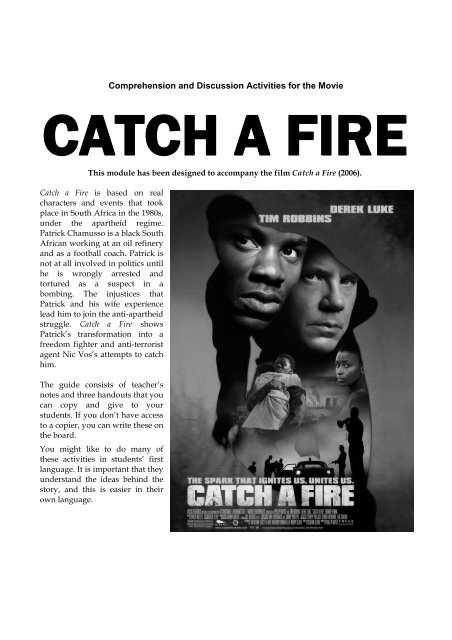
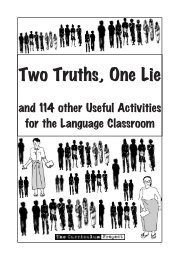
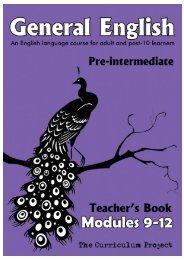
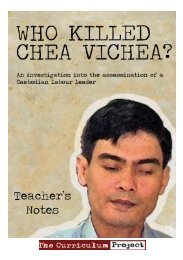
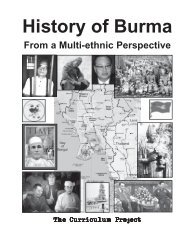
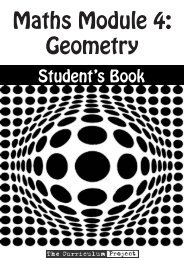

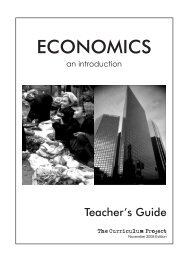
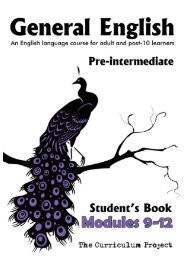

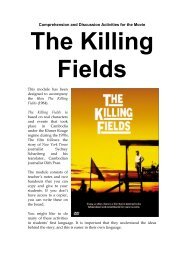
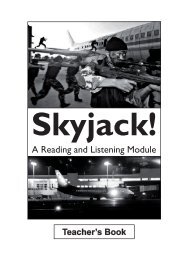
![[Eng] Nov 2012 DRAFT - The Curriculum Project](https://img.yumpu.com/45590859/1/184x260/eng-nov-2012-draft-the-curriculum-project.jpg?quality=85)
